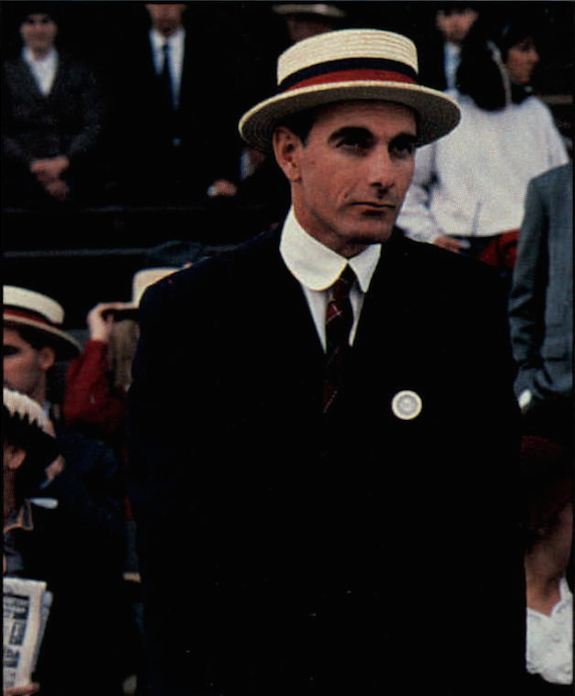
John Sayles is one of the Great American Filmmakers, but you don’t hear him referred to as such nearly often enough.
Sure, he’s pulled down a pair of Best Original Screenplay noms, has undisputed gems like EIGHT MEN OUT and LONE STAR under his belt, and was featured in one of our very own AICN Legends columns a couple of years back. But still, you don’t hear his name mentioned with the kind of reverence as fellow
As the retrospective of his work, beginning tonight through Saturday at the Cinefamily here in Hollywood, makes abundantly clear, this is no accident. Sayles has made a steady career as a screenwriter-for-hire (on films like THE HOWLING, APOLLO 13, MIMIC, and the legendary, unproduced JURASSIC PARK 4), and has used the money from those gigs to fund his smaller, significantly less commercial projects. He’s directed 18 features to date, none with the base commercial appeal as the Corman films he cut his teeth on (including PIRANHA, THE LADY IN RED, and BATTLE BEYOND THE STARS). Instead, his films almost universally focus on segments of society normally ignored by mainstream cinema: blue-collar union workers (MATEWAN), small town denizens (LONE STAR, SUNSHINE STATE), local politicians (CITY OF HOPE), largely African-American communities (THE BROTHER FROM ANOTHER PLANET, HONEYDRIPPER), Mexican-American relations (MEN WITH GUNS, GO FOR SISTERS, SILVER CITY), and the physically handicapped (PASSION FISH). He’s worked with cinematographers like Roger Deakins, Robert Richardson, Dick Pope, and even Haskell Wexler (who’s shot four of his films), and his films often have a lyrical, evocative feel to them, with the script and visuals working perfectly in tandem. He is typically more interested in ensemble pieces than star-driven projects, but his films tend to attract the highest caliber of actor, including folks he’s worked with a whole bunch like Chris Cooper, Angela Bassett, Kris Kristofferson, and his old college buddy and seven-time collaborator, David Strathairn.
I have always had an enormous respect for Sayles’ ability to navigate the studio scene while carving out time and money to film his personal, small-scale projects, as well as the fact that he still manages to put out a film every few years despite the increasingly fractured independent film scene (he’s made statements to the effect of, “There’s no way to make a living in independent film anymore.”). I was honored to speak with Mr. Sayles about the upcoming retrospective (which will screen RETURN OF THE SECAUCUS 7, BROTHER FROM ANOTHER PLANET, PIRANHA, CITY OF HOPE, LIANNA, and the rarely-shown teen romance BABY, IT’S YOU), as well as his career as a hired gun, and the upcoming sequel to Sergio Corbucci’s DJANGO, DJANGO LIVES, featuring Franco Nero's return to the title role:
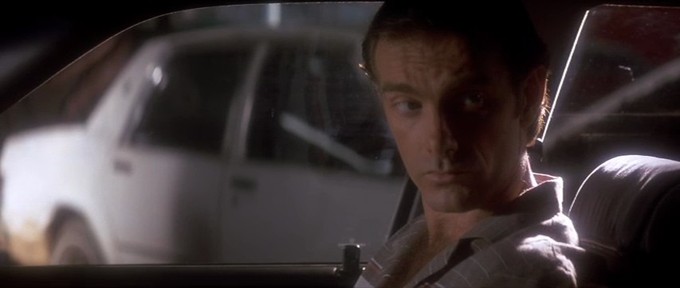
VINYARD: I want to talk about this tribute they’re doing for you this weekend at Cinefamily. I’d imagine it’s not the first time your work has been featured in a tribute like this.
SAYLES: Yeah, we had a very good one in Thessaloniki, Greece several years ago, but then you continue to make movies so sometimes there’s new movies to be thrown into them. We’ve made 18 features, so it’s pretty rare that they show everything we’ve done. It’s always nice to have these movies trotted out so people can see them again, or people who’ve never seen them have a shot at seeing them on the screen.
VINYARD: Are they screening anything in particular that you haven’t really seen screened?
SAYLES: The one that has probably not been seen much is BABY, IT’S YOU. It played at the (American) Cinemateque a couple of years ago, and for the first- God, it was almost 10 years after it was made- it was not available on home video or any of that, so a lot of people never saw it. CITY OF HOPE is the other one that people don’t see very often. LIANNA...a lot of them don’t get on television that much or haven’t been available on home video.
VINYARD: Going back to BABY, IT’S YOU. I read was the only time you ever worked with a studio and where you didn’t have final cut.
SAYLES: I worked with Sony on EIGHT MEN OUT, and that was kind of a, “You get final cut if the movie’s under two hours,” so, you know, the movie’s 119 minutes and 48 seconds or whatever. But yeah, (BABY, IT’S YOU) was kind of a fight in the editing room, and it ended up being the movie that I wanted it to be, but they weren’t happy with it so they didn’t put any great effort into distributing it.
VINYARD: Is there any reason why you haven’t worked with any studio on your other directing projects?
SAYLES: That’s not the way they were financed. LIMBO was also Sony, and John Calley was running Sony and that was fine. Generally, you have a movie you wanna make, and if the studios aren’t interested, then you find another way to get it financed. I certainly haven’t been asked by studios to direct anything in the last 25 years. The other ones, every once in a while, you have something you think is more commercial, and you try the studios and they say no, and then if you wanna make it, you gotta find another way to finance it.
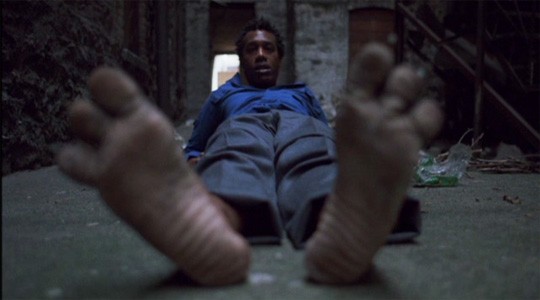
VINYARD: One thing I think studios might be freaked out about in regards to your writing is your tendency to focus on untraditional underdogs, more underexposed aspects of society, blue-collar America, Spanish-speaking cultures, third-world countries that are in turmoil, things that aren’t as sexy as what the studios are looking for.
SAYLES: I think to a certain extent, and also that the stories are complex. They’re not simple underdog stories. They’re not simple good guy and bad guy stories. And that’s truly harder to sell. If you think of making a trailer for a movie, the simpler the story is, the easier it is to tell that story in a two-minute trailer and get people excited about it, whereas if it’s kind of an ensemble piece or it’s more complex or whatever, it’s hard to tell that story in a trailer. It’s hard to advertise that thing. That’s the first part of getting an audience, and for a studio who really depends on advertising to bring a lot of people in, they tend to gravitate towards much more simple things. Or it’s genre things. Actually, some of the most interesting movies might be a genre that gets the people in, even if the characters and the situation are more complex.
VINYARD: You’ve worked with the studios over the years on scripts without actually directing for them, so I’d imagine you have a very good idea of what they’re looking for and what you’d need to give them to get a film financed.
SAYLES: Yeah, if the point was just to get studio money, there’s things that I could probably cook up that they’d be more interested in. But really a very small percentage of Hollywood movies come from people coming to them with an idea on spec. A lot more of it is they generate the idea, they have a tentpole, they have writers they’ve already worked with saying, “What about this variation on what you’ve already been doing,” and that’s how their movies come about. Just coming in with a screenplay or an idea, it’s pretty rare that those things get made by studios.
VINYARD: So when studios approach you to work on projects they’re developing in-house, what do you think that they expect you to bring to the project?
SAYLES: The mandate is pretty different each time. It might be, “Oh, we want to make this character more complex,” “We want to set this in the past and you’re good at historical stuff.” Each time it’s actually a different kind of thing. Generally, it’s that they want to take the story and and go a little deeper. “The story right now is a little surface.” Sometimes it’s that the actors have said, “I might be interested in being in this, but there’s not that much there to my character or to the story.” It really does vary quite a bit.
It very often is not necessarily the studio who’s asking me to come in and do a rewrite, it’s a director. Occasionally it’s an actor who has something that they’ve been trying to develop at a studio, and they want me to take a pass at it. It does vary, which is one of the nice things about the job. I’ve been around enough and I’ve worked in enough genres that I’m not typecast as only doing romances or only doing comedies or whatever. I’ve gotten to work on science-fiction and westerns and historical pictures and contemporary dramas and political thrillers and things like that, and each of them has their own rhythm and world that you enter when you’re working on them.
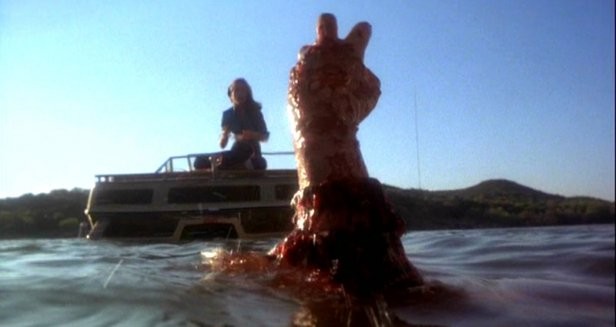
VINYARD: It is a pleasant process, as a writer, having to do something like that, where you’re told to inject substance into something?
SAYLES: Yeah. I mean, a lot of writing is problem solving, and the first problem you have to solve is when you get your marching orders from the people who either want you to write something or rewrite something. It’s not always well-articulated. They may be just fishing. The first thing you have to do is talk to them about, “What do you like about the script that you’ve already got? What do you want to keep?” So the next thing is, “Do you have any real idea what direction you wanna go?” Sometimes it can be pretty specific, and other times it’s, “Well, it just doesn’t quite work.” That’s always the hardest writing, guessing what they might want. And maybe they won’t know it ’til they see it, ’til it’s right in front of ‘em. That’s the challenge, but problem solving is always interesting.
I’m working on a thing right now, I’m one of four writers adapting this novel that came out a couple of years ago called The Alienist, which is set in 1896 when Teddy Roosevelt is the police commissioner of New York City, into a 10-part miniseries. If you’re gonna have it play out over ten episodes, if you insert a new element, and it’s a mystery, you’ve gotta make that work throughout all ten episodes. Everything you do affects everybody on each episode. And I’m only doing two of them, so a lot of what the meetings are about is about coordinating those things.
When you’re doing a feature, it’s the same thing. If they say, “We want to make the female lead 20 instead of 40,” well, that affects who that character is. It’s not just, “We have a different actress play her.” That affects what they know about the world, or whether they have a family, or they have a history, or whatever. A lot of it, for me, is making the thing make sense. Not just kinda plot sense but emotional sense. When you change something when you’re brought in to add an element or change the direction of the story, you’ve gotta really think about what are the ramifications of the change.
VINYARD: Have you ever thought about being on the other side of that, and working with another writer on something that you didn’t actually write yourself?
SAYLES: The only time I’ve ever done something like that was years ago, I wrote a TV series called SHANNON’S DEAL. I wrote the TV pilot, which was like a 2-hour TV movie that Lewis Teague directed that was very good, then I wrote the first two episodes, and after that I just kind of…if I felt they were in trouble with an episode, I might give them some notes that would be sent on to the writer. I don’t think I want to sit around and literally be a showrunner, but it’s an interesting process. I know people who have done it. I’m sure it can be frustrating. Some showrunners just assume, “Well, they’re just gonna do their drafts, then I’ll rewrite them.” There are other showrunners who really want to develop the writers and talk to the writers and get the writers to get to where they feel like the episode is good. So they don’t have to actually ever write anything down on paper. It’s always just in terms of conversation and notes. I’ve been kind of a one-man-show on my own features that that’s probably not going to be the easiest thing to do, which is why I don’t think being a showrunner is that attractive to me.
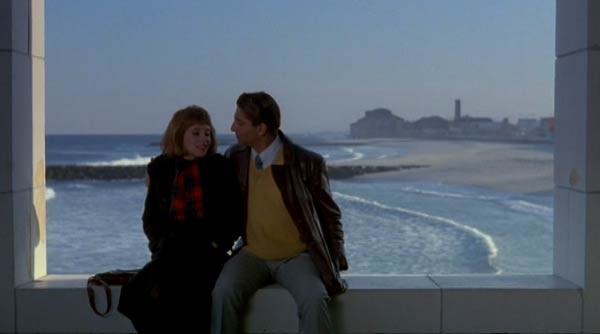
VINYARD: Change topic for a second: at least three of your films have been set in New Jersey. I know you grew up in New York (Schenectady), but RETURN OF THE SEACAUCUS 7, BABY, IT’S YOU, and CITY OF HOPE are set in New Jersey. Being from New Jersey myself, I’m curious what drew you toward shooting those films there?
SAYLES: Well, I did live in Hoboken for about 20 years, and we still have our office there, so I still keep up with what’s going on in the state and in that area, the politics and the culture and whatever. I think some of it is that the urban thing that I’ve written…New York City has it’s own character, big cities like Boston and Philadelphia have their own character. New Jersey cities tend to have all the problems, but maybe not the brand that those big cities do, so it’s almost like, in the case of CITY OF HOPE, you hear about the newspapers. In New York City, any thing that gets into the New York City newspapers, it might as well be national. There’s another player in the game. Same thing with Boston. I don’t know if you saw the movie about the priests that they just made. Those newspapers are players. In cities like Newark and Jersey City or whatever, yeah, people read the local papers, they read the Hudson Dispatch and Jersey Journal and stuff like that, but they don’t wield that kind of power. The media are just kind of there, but they don’t go national necessarily. So there’s a size. And I’m an independent filmmaker, I really don’t have the money to shoot in New York City, honestly. It’s on a scale that I just rather the money went somewhere else on the screen.
VINYARD: One thing I heard you were working on which really caught me offguard was DJANGO LIVES, the sequel to Sergio Corbucci’s DJANGO from the late-60s. I know you’ve worked as a writer-for-hire many times, but this didn’t seem like the traditional studio film that they’d call you up for. Can you talk about how they got ahold of you, and why you wanted to take the job?
SAYLES: A friend of mine from Austin who’s involved was trying to help get it off the ground. It’s a movie I really enjoyed when I saw it. I really like the spaghetti western genre. The basic plot twist that really attracted me was that it was gonna be Franco Nero playing the character. He’s in very good shape, and he can certainly hold the screen still, but it’s about a guy who’s an old guy who’s survived the Civil War and various other traumatic things afterwards, and we find him at the beginning of the movie working as a horsehandler, an extra on the set of BIRTH OF A NATION. That seemed like such a great setup to me to kickoff the movie. I’ve done the screenplay, and now they’re trying to raise the money for it. I think if it had just been, “Let’s make a sequel to it with a different actor,” I wouldn’t have been attracted, but the idea of a character that you know…and I think Franco was maybe in two of the DJANGO movies, then there were dozens made with different actors. I love the idea of a guy who has that kind of history. What does it mean to be a 70-year-old gunslinger?
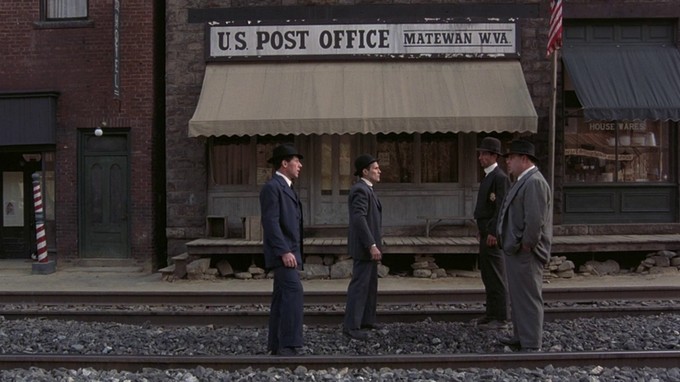
VINYARD: One more question: a lot of your films focus on blue-collar politics and unions and maybe more socialist politics than you see in mainstream filmmaking. Is there anything about this current political season that’s gotten your attention at all?
SAYLES: What I think is interesting is that- I walked into a room the other night and the people sitting there were watching the Republican debate- is that the way that reality TV and game shows have infected the debates. There was Trump and Bush and all the other guys standing there, and they were doing buzzers and bells, and it just seemed like THE BACHELOR or HOLLYWOOD SQUARES or something like that. The way that political debate has sunk to the point where it’s like professional wrestling. We want fireworks, that’s what entertains people. We can’t actually just have a discussion. I guess it’s inevitable that now you get elected through the media, that the media infects the politics and the politics infect the media. It certainly doesn’t seem like we’re talking about anything very seriously, the way the format works.
VINYARD: Does it give you any kind of hope that Bernie Sanders was able to build his campaign on individual contributions rather than the formal route?
SAYLES: Yeah. If he ever got to be a candidate, I think that’s a good thing. I think that lobbies and corporations have a non-democratic effect on our government. If we’re trying to have a democracy, their power should be controlled, and it’s not very well-controlled. I think it was one of Obama’s selling point. Whether he paid off on all of his promises and desires, he at least wasn’t financed by the corporations and didn’t owe them an arm and a leg when he got in. Who is your constituency if you get to run because this corporation or that corporation put you up? Who are you beholden to? If it’s the American people, or a certain segment of the American people who put you in there, that’s the people who you owe when you get into office. As a voter, that’s what I would be interested in.
Anyway, it’s all very entertaining. I was saying to someone the other day, “There’s a good half-hour sitcom which is the telephone call that Obama has to make to some guy and says, ‘Here’s the deal: I’m gonna put you up for Supreme Court Justice, so if you’ve ever done anything bad or embarrassing in your past, it’s gonna be national news, and then at the end of a month of scrutiny, you’re not gonna get the job.’” Who’s gonna wanna do that? Who’s gonna wanna be that sacrificial lamb, to have the Republicans work you over for a month, and then say, “No, we don’t wanna accept this guy.” I’ll be interested to see who steps up to the plate for that one.
VINYARD: I’ll let you go. I didn’t get to ask you about David Strathairn, so I’ll ask you to just please work him into your next project.
SAYLES: I think he’s gonna come down and see a couple of the movies, so if you run into him there, you’ll be able to ask him personally.
A WEEKEND WITH JOHN SAYLES will be running starting tonight through Saturday at the Cinefamily/Silent Movie Theater on Fairfax in Hollywood. Mr. Sayles will be making appearances at every show, so be sure to head over to Cinefamily.org for times and tickets.
